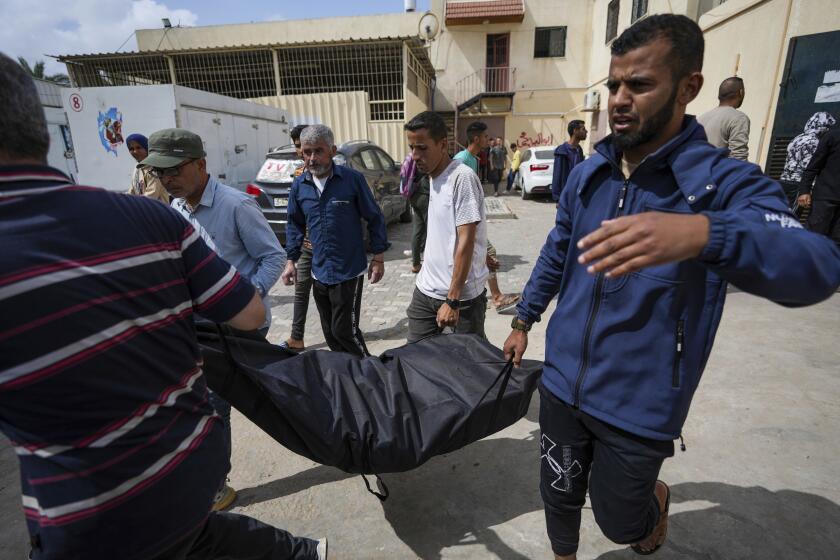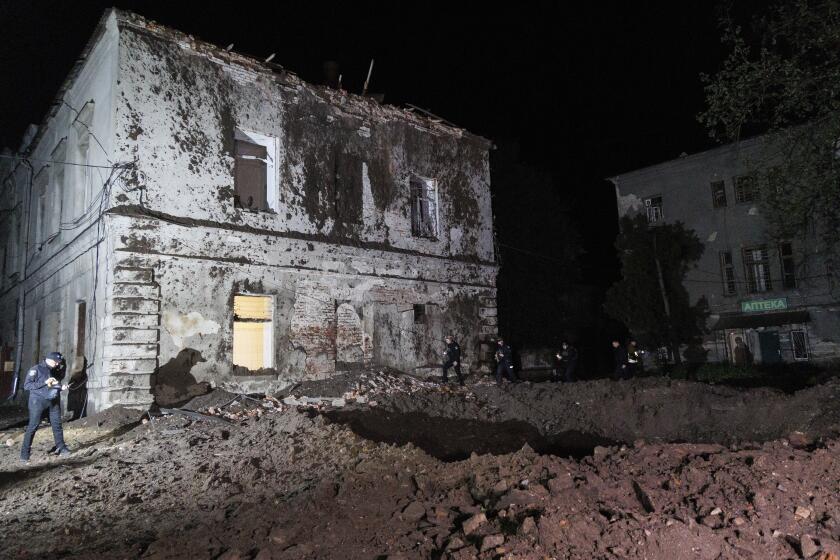U.S. Nuclear Stance Gets Support from Russia, China
Russia and China are expressing new support for the U.S. stance on how to deal with the worrisome nuclear programs of Iran and North Korea, senior administration officials said Sunday.
The fresh indications of cooperation came from Russian President Vladimir V. Putin and Chinese President Hu Jintao in private meetings with President Bush, said the officials, speaking on condition that they not be further identified.
One of the officials said Hu conveyed a message to Bush from North Korea that marks a change in the North’s position about how tensions over its nuclear activities can be resolved: Instead of demanding direct talks with the U.S., North Korea is now asking for “bilateral contacts” in the context of a multilateral meeting.
The U.S. has said repeatedly that it is only willing to meet with North Korea if China, South Korea and Japan also attend.
“In terms of the North Koreans, yes, they’ve moved; they have moved a little bit,” the official told reporters here where Bush and Hu met Sunday with leaders of the Group of 8 major industrialized nations.
Bush insisted that any meetings with North Korea be multilateral, and Hu agreed, the official said. Although China has urged Washington and Pyongyang to talk directly, Hu “didn’t ask for a bilateral meeting,” the official said. The Chinese have “given up on that, and the Chinese acknowledge that that probably isn’t the most effective way,” the official added.
Instead, Hu welcomed “the assurance that we’d be willing to listen to North Korean concerns, sitting around a table of four or five other parties,” the official said. “The Chinese did not push back on that concept.”
Earlier Sunday, Bush and Putin held intense discussions in St. Petersburg on Iran’s nuclear aspirations. Russia has been helping Iran build a light-water reactor in the port of Bushehr. Washington believes Iran is using the project to obtain nuclear-weapons technology. Recent revelations that Iran is developing the capability to enrich uranium --which can be used in nuclear weapons -- have dismayed Moscow, administration officials said. The Russians have expressed such views so far mainly in private, but at a joint news conference before Bush left Russia, Putin voiced strong support for U.S. principles.
“The positions of Russia and the United States on the issue are much closer than they seem,” Putin told reporters in the Konstantinovsky Palace. “We need no convincing that proliferation of weapons of mass destruction should be prevented.”
But in a comment reflecting continuing tensions over Russia’s financial interests in Bushehr, Putin added that Russia does not want allegations about an Iranian weapons program to be a “pretext” for “unfair competition against us.”
Russia has noted with umbrage that British equipment was used in Iran’s uranium-enrichment program, and Russian officials have insinuated that the West is quietly profiting from Iran’s program while publicly denouncing it. But a second senior administration official said U.S. officials believe the British technology was transferred illegally, without the knowledge of Western companies. In general, the official said, “there’s been some bridging of the differences” with Russia over Iran.
In recent months, Russian officials have backed away from their insistence that Iran’s nuclear program is entirely peaceful. They still say there is nothing improper about the Bushehr project but are calling for Iran to give stronger guarantees to the International Atomic Energy Agency that it is not being used to obtain weapons technology.
The IAEA will consider the Iran issue at a mid-June meeting in Vienna and can refer the issue to the U.N. Security Council if it decides Iran has broken nonproliferation commitments.
*
Reynolds reported from Evian and Holley from St. Petersburg.
More to Read
Start your day right
Sign up for Essential California for news, features and recommendations from the L.A. Times and beyond in your inbox six days a week.
You may occasionally receive promotional content from the Los Angeles Times.






